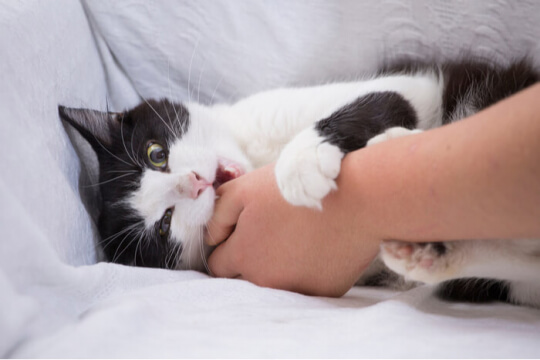
We love interacting and spending time with our cats whether through petting, holding, playing or training, but what happens when our cat isn’t in the mood, defensive or in pain, and bites us? In this article, we’ll explore the answers to the question “why does my cat bite me for no reason?” to better understand why cats bite and what to do when biting happens.
‘Aggression’ is serious and may lead to injury to people, and other pets, moreover zoonosis can transmit from cats to people through aggressive acts.
Understanding the cat’s normal social behaviour, communication, facial expressions and feline emotions can prevent hostile behaviour towards carers.
Let’s explore why cats bite humans and how to tell if your cat gives you ‘love bites’ or nips due to frustration or discomfort.
Understanding ‘Aggression’
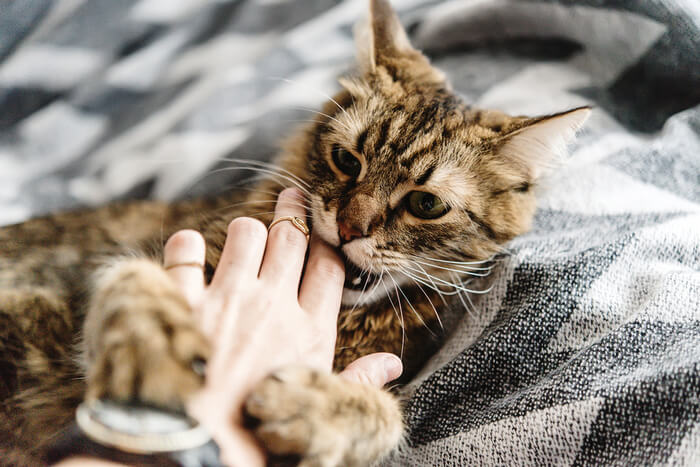
In order to understand why your cat bites you, you need to understand why cats exhibit aggressive behaviors in general.
Aggressive responses are related to innate behaviour of cats and a normal part of predation, play and social conflict which are all essential for survival of a territorial, independent, solitary hunter.
Aggression isn’t a temperament trait or a diagnosis, it’s a consequence of an emotional state. Â
While humans use feelings to describe how they feel, cats’ emotions are depicted as motivational-emotional systems, responsible for instinctual arousal instead of the feelings of emotion (Heath, 2018).
If a pet cat starts displaying aggression towards humans, then this represents a ‘problem behaviour’ needing distinctive assessment.
Aggression in cats is typically related to:
- Genetics and former experiences. Genetic differences in temperament will affect how stressed a cat becomes in certain situations, how it reacts to a stressor, and the length of time a negative emotion lasts after the trigger has vanished. In addition to genetics, previous experiences play a role in individual’s flexibility to adopt to change.
- Lack of socialization. Hand-raised kittens and adult cats that haven’t been socialized with previous cats or handled by humans between 2 -14 weeks old tend to be more nervous, fearful, aggressive with a reduced ability to handle environmental alterations.
- Fear. Cats may react both offensively and defensively out of fear when they feel vulnerable, perceive a threat and imminent danger. The cat may respond in an aggressive manner by piercing if escape is unavoidable.
- Social conflict. Pet cats don’t have control of who they live with or which cats or other pets they share their home with, it’s evident some cats cope better with confinement and social living than others.
Reasons Why Cats Bite People
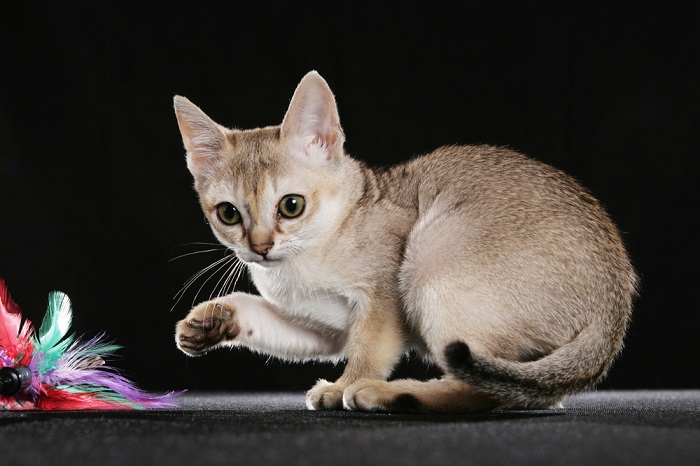
You can avoid the attack with short petting sessions or by giving your cat attention in other ways.
Cats may bite people for a variety of reasons, including improper play habits in childhood, overstimulation, affection, and more.Hostility toward people is a common cat behaviour problem. Categories include but aren’t limited to:
1. Improper Kitten Play
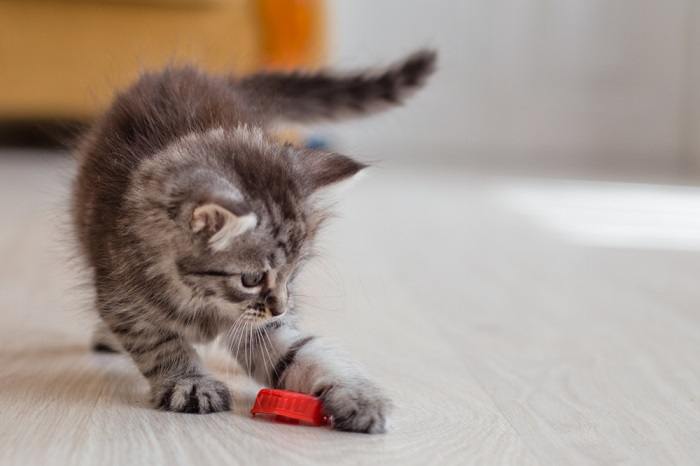
Petting-induced belligerence is annoying and upsetting to pet owners. It’s usually related to cats who become less tolerant of petting as they socially mature.
Kittens who engage in rough fights during kittenhood are usually disrupted by mum if it becomes a touch vicious, teaching bite inhibition.
Social play includes wrestling, pouncing, piercing and episodes of play-fighting. Inadvertently, when humans attempt similar type games using their hands, reinforce its excitable behaviour encouraging kittens to grow into adult felines who pounce on hands and feet once they want play or attention.
2. Petting ‘Aggression’
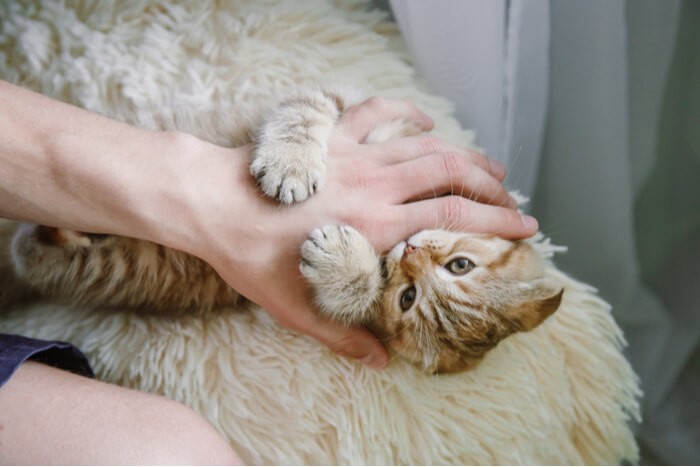
Cats will occasionally bite when they’re pet in a way that is overstimulating or makes them feel vulnerable.
Petting-induced resentment happens when a cat solicits attention by being petted in part of their body that creates him or her feel vulnerable (belly, chest or back), then abruptly stops the interaction with clawing or stinging. Usually, the cat becomes overstimulated or agitated needing to stop the interaction.
Also Read: How To Pet A Cat – The 3 Basic Do’s And Don’t’s
Petting-induced belligerence is annoying and upsetting to pet owners. It’s usually related to cats who become less tolerant of petting as they socially mature. You can avoid the attack with short petting sessions or by giving your cat attention in other ways.
3. Redirected Frustration
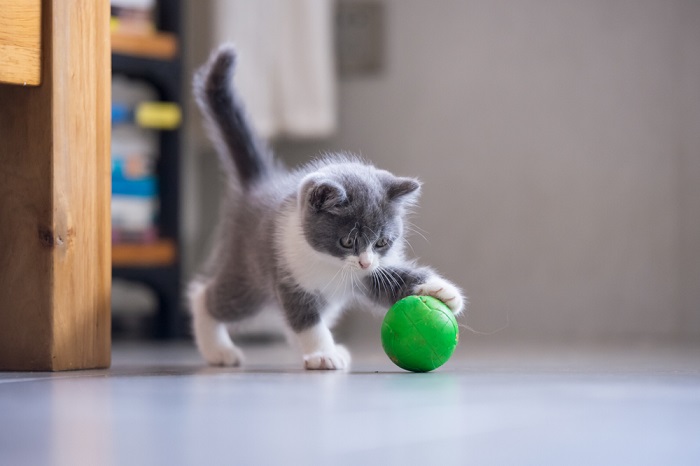
Socializing cats to a variety of individuals and situations can prevent varieties of human-directed violence.
If a cat is extremely aroused by an outdoor moggie or an event, may redirect their hostility towards another pet or unsuspected nearby owner.
The stressful stimulus or the presence of the owner will activate the tension response leading towards an attack. Never try to handle your cat during this aroused state since it can cause serious injury.
4. Medical and Painful Conditions
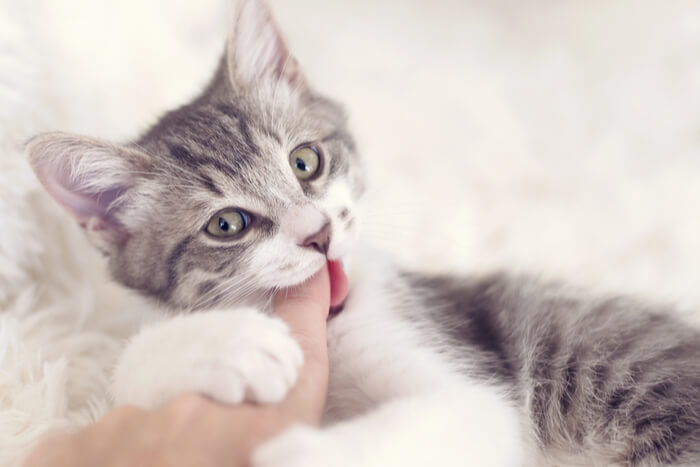
Cats will sometimes bite or exhibit other aggressive behaviors because they are in pain.
Confession time – my female cat has pain associated aggression; it took me a long time to work it out after multiple grips and vet visits. A cat who is sick or in pain may attack their owner (unintentionally) if approached or touched in an exceedingly vulnerable spot.
In my case, mild touch on her arthritic hips or brushing her lower spine caused her to react with antagonism.
Both acute and chronic pain can prompt tactile sensitivity and biting. Painful conditions like dental disorders, Degenerative Joint Disease (DJD), meningioma, Intervertebral Disk Disease (IVDD), FIC, wound or injury often induce a negative emotional state of anxiety and/or frustration and should prompt owners to seek immediate veterinary assistance.
What To Do If Your Cat Bites You?
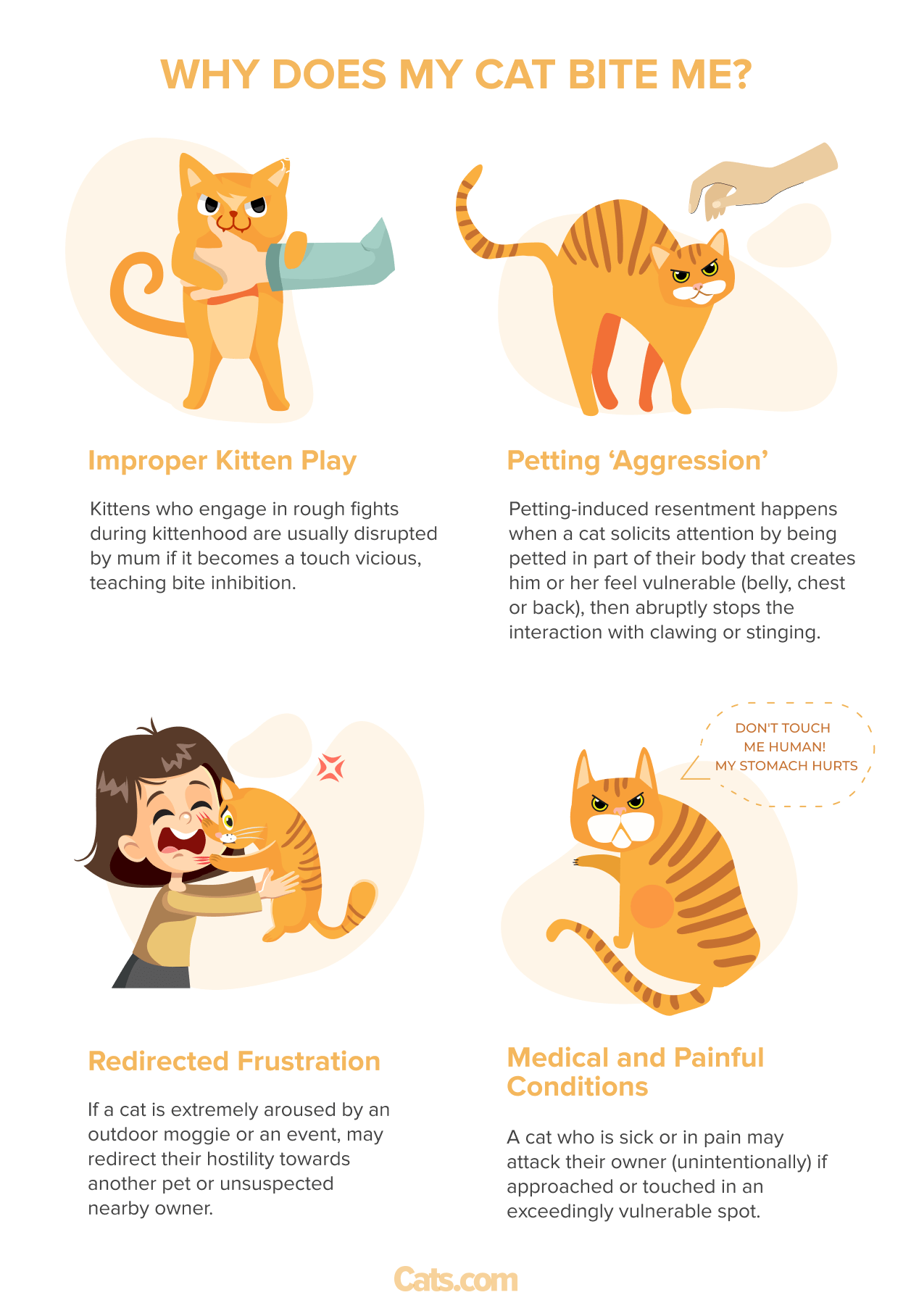
Safety and prevention of further injury is paramount. Stop interacting with your cat and leave immediately.
Don’t shout, touch or punish your cat, especially if it’s in a highly aroused state (aggressive vocalization/body language, behaving uncharacteristically).
If possible, separate the cat from humans, children, and other pets in a different room with lights deemed off. Once the cat is safe, treat all wounds plus seek medical advice instantly.
Usually, cats calm down within a few hours. Stop initiating any contact, allow your cat to decide on when to interact and for how long. This can cause you to appear less intimidating and meddling.
A few days later, start desensitization and counter-conditioning your cat gradually to touch and handling, which should deepen the human-animal bond. If your cat demonstrates fearfulness or ‘aggression’ when touched, seek help from a certified behaviour consultant or a veterinary behaviorist.
Lastly, take your cat to the vet for an in-depth examination to rule out an underlying medical reason. Â Â
How To Stop And Prevent Cat Biting?
Don’t Let Your Kitten Bite Your Hands Or Feet!
Kittens are super energetic and love playing. Avoid luring your kitty to play by jiggling your fingers or toes, then get dismayed when he or she scratches or prick you. If your kitten attempts to nibble body parts, look or step away before giving them attention.
Also Read:Â How To Take Care Of A Kitten: The Complete Guide
Always offer your moggie appropriate toys as a substitute, rotate games as much as possible since cats like novelty objects.
Avoid stroking or picking the kitten during or after playtime because it might unintentionally encourage the kitten to think hands are toys. Hands are for loving – not for nipping!
If your kitten persistently nips, discourage him or her by blowing sharply but gently on the kitten’s face.
Expose young cats to gentle, positive body handling to make sure they grow into adults who enjoy being stroked.
Pay attention to areas your individual cats likes to be stroked, only pet him or her where they’re comfortable.
Most cats prefer short sessions (seconds) of touch on parts of their body where scent glands are located such as the top of their head, cheeks and chin. Certain cats like quick, short strokes whilst others slower, longer strokes.
Watch out for warning signs of agitation like tail swishing, piloerection, skin twitching, sudden vocalization, cat looking back at you and position shifting.
It’s important our cats learn to cope with unavoidable events life throws at them. There could also be situations needing vet visits, grooming, medication or just meeting unannounced visitors. Socializing cats to a variety of individuals and situations can prevent varieties of human-directed violence.
Use Redirection Training

Set up an enriched environment to improve physical activity, mental stimulation, decrease boredom, and prevent behaviour problems exhibited by under-stimulated cats.
Redirect undesired behaviour with clicker along with target training and reward with treats or positive attention to encourage desired behaviour.
Environmental Adjustments Can Also Help
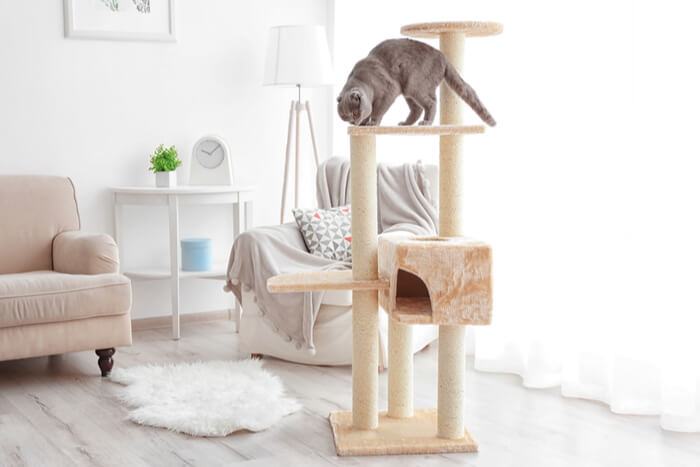
Providing an enriched environment—one with cat trees, shelves, and toys—can help to prevent biting and other forms of unwanted behavior.
Set up an enriched environment to improve physical activity, mental stimulation, decrease boredom, and prevent behaviour problems exhibited by under-stimulated cats.
Frustrated, angry indoor cats should be given outdoor access (ideally unrestricted) with numerous opportunities for climbing, exploration and problem-solving possibilities.
Here are a few ways to enrich your cat’s environment:
Increase Hiding And Perching Spots
Increase the number of hiding spots, high perching areas, and quiet areas (cat castles, boxes) to assist your cat feel comfy and reduce competition in multi-cat homes. Viewing platforms will allow your cat to accustom to new places, noises, and experiences without the necessity to retreat.
Minimise Environmental Changes
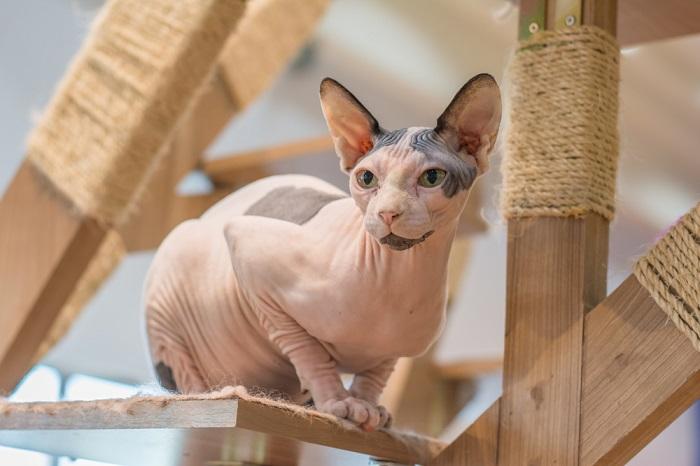
Viewing platforms will allow your cat to accustom to new places, noises, and experiences without the necessity to retreat.
Keep the house environment predictable with a sense of security. Regular and gradual environmental changes can help to keep your cat from startling easily. If you must make a sudden environmental change, try pheromone products to assist the reduction of fear-based aggression.
Provide Food Puzzles and Predatory Games
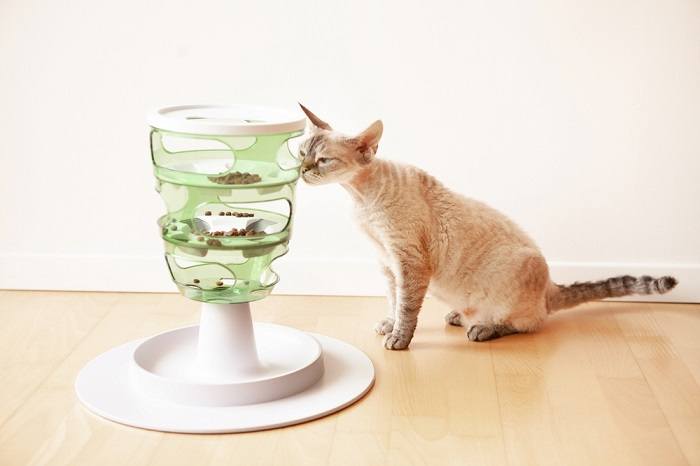
Ensure your cat has an appropriate outlet for hunting games each day. Avoid frustration-provoking play with laser pointers only.
Use food puzzles to resolve situations where the cat experiences frustration, when food isn’t easily obtainable or as a natural concept for hunting behaviour.
Ensure your cat has an appropriate outlet for hunting games each day. Avoid frustration-provoking play with laser pointers only.
Predation of hands and feet won’t occur once your cat has an opportunity for stalking games with toys like Hartz Just For Cats Kitty Caster Cat Wand Toy, Cat Dancer, and SmartyKatSkitter Critters Cat Toy. Follow play sessions with treats to finish the hunting sequence.
Also Read:Â The 10 Best Cat Slow Feeders & Puzzle Feeders
Residing in a domestic environment puts considerable pressure on pet cats. Enhancing their physical and social environment is each owner’s responsibility.
Cases involving human-directed ‘aggression’ are often tackled using a big selection of interventions. In some instances, behaviour modification and medication can also help.
Frequently Asked Questions
Why does my cat bite me when he's being affectionate?
Certain cats may give you ‘love bites’ as an indication of affection. Little nibbles in the type of tiny, caring delicate gestures adopted from kittenhood playfulness converted into adulthood. Pleasurable with no pain or hostility. Â
What should you do if your cat bites you?
Cease immediate interaction with your cat and leave the room. Cat bites require medical attention, wound cleaning and possible course of antibiotics including veterinary check-up.
Why do cats bite their owners for no reason?
Cats don’t bite with no reason. Pain, illness, stress and changes within the cat’s physical or social environment can all manifest through behavioural changes. Cats communicate by attempting to shield themselves and stop interaction. Owners must learn to recognise signs of distress displayed through body language then try identifying the underlying reason for the behaviour.
-
Ellis, S. (2020, January). Understanding and recognising fear, anxiety and frustration. Feline Focus. (I. C. Care, Compiler) Tisbury, Wiltshire, UK. Retrieved December 08, 2020
-
Halls, V. (2020). I’m not bad, I just do bad things!’: Reframing our thoughts on aggressive cats. International Society of Feline Medicine Symposium (pp. 1-7). UK: ISFM. Retrieved December 18, 2020
-
Heath, I. R. (2016). Feline Behavioral Health and Welfare. St Louis, MO: Elsevier. Pg 73-77, 232-238, 376-382. Retrieved December 15, 2020
-
Heath, S. (2018). Understanding Feline Emotions and their role in problem behaviours. Journal of Feline Medicine and Surgery, 20, 437-444. Retrieved December 10, 2020
-
Helen Tuzio, T. E. (2004). FELINE BEHAVIOR GUIDELINES. (A. A. Practitioners, Compiler) USA: AAFP. Retrieved December 08, 2020
-
Miller, P. G. (2020, December 07). Training Cats. Barks from the Guild. (B. Magazine, Compiler) USA.
-
Rodan, D. F. (2018). Behavioral Awareness in the Feline Consultation - Understanding physical and emotional health. Journal of Feline Medicine and Surgery, 20, 423-436. Retrieved December 12, 2020
-
Stanslaski, J. (2020). Why does my cat - Curious and odd behaviours of our feline companions. International Society of Feline Medicine Symposium (pp. 9-13). ISFM. Retrieved December 12, 2020

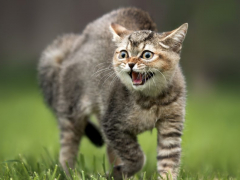
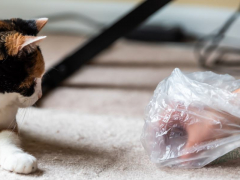
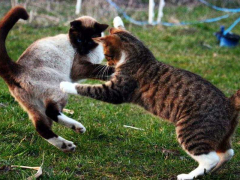
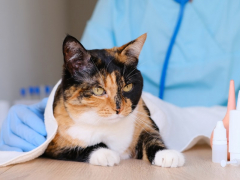



I found this article on cat biting insightful and informative. It covers a wide range of reasons behind cat biting behaviors, from improper play habits to medical conditions, offering practical solutions for cat owners. The emphasis on understanding feline behavior and creating enriched environments to prevent biting was particularly helpful. Overall, it’s a valuable resource for cat owners seeking to better understand and address this common issue.
I found this article on cat biting insightful and informative. It covers a wide range of reasons behind cat biting behaviors, from improper play habits to medical conditions, offering practical solutions for cat owners. The emphasis on understanding feline behavior and creating enriched environments to prevent biting was particularly helpful. Overall, it’s a valuable resource for cat owners seeking to better understand and address this common issue.
I have three cats, all rescues, two of which will occasionally very lightly put their teeth on my fingers while petting or tickling them, but one of those, who would be in my arms all day if I let him, will sometimes try to bite my chin very hard to the extent that he will draw blood. I know it is an affectionate bite, not intentionally aggressive. I liken it to how young children will sometimes bite other children they may like.
After the 2nd sets of vaccines on my 9week old kitten he got diarrhea, he is very active and eats, and his diarrhea is lite brown,,, What should I do.
Hi Martha, sorry to hear your kitten isn’t feeling well! Have you changed your kitten’s diet lately, or does it seem clear that the diarrhea is linked to the vaccines? Mild reactions to vaccines generally only last a day or two, but it’s worth checking in with your vet. Diarrhea could be a sign of a negative reaction or it could be nothing to worry about but your vet is the best person to determine which.
MY CAT IS A KITTEN.SHE IS A STRAY. SHE BITES DOWN HARD,BUT I IGNORE AND TRY TO BE FRIENDLY WITH HER.
IT DOES NOT WORK.
Hi Ron,
Congrats on your new family addition. You might need to try a different approach since she’s a kitten. Here are few tips: 1. Stop play and ignore biting and/or scratching behavior immediately. 2. Use your voice say a sharp ‘ouch’ or yelp in pain, that will startle her and may stop the biting behavior. 3. Increase playtime to 3-4 sessions per day and lastly 4. Avoid luring her with a tiny toy in your hand since she may regard your hand as a part of the toy.
Hope this helps, keep us posted!
Melina
VERY GOOD SUGGESTIONS.
HAPPY HOLIDAYS
RON
My cat will bite me if I stay in bed too long. She likes to sleep with me and gets restless. Or if she becomes aroused for the hunt while I pet her, usually while I am in bed. When she gets like this I might let her get a quick taste without exposing the fleshiest parts of my hand below my thumb finger or she will bite down hard. It seems to give her pleasure. I KNOW it is hunting related. Most of the time I end up putting my arms under the blankets, because if I just pull away, she will actually get up from her laying position in bed and come after me! I avoid letting her get very far because I’ve had to get antibiotics for infection before, so I’m fair warned. I wish I could find a toy that has the feeling of biting into meaty flesh that I could buy her. So far nothing I have found works. Stuffed animal-type toys don’t even come close. If someone is innovative enough to solve this cat toy demand, they could be incredibly successful!
My cat is generally my sweetie side kick, following me everywhere and perching within a few feet to oversee whatever I’m doing (and butting me for pets and scritches). But sometimes (usually late at night) she will come to the edge of the bed frame, stare up me or the dog with huuuge dilated pupils. She’ll start swaying slowly, then lunge at one of us, bite, then flee. Then comes back and will do it (or try) a few more times. I hardly recognize her when she gets like this- she looks possessed and it freaks me out! Where is my sweet girl?! I’ve wondered if maybe it’s boredom? She’s definitely a hunter- loves perching at the window chittering at birds for long periods, bats at everything, drags her wand toy and drops it at my feet then taps me, plays a ton with the dog (they love each other). She even regularly ‘chases’(?) the dining room upholstered chairs by zooming to the top, flinging herself about and holding/grabbing on like its a tree, then zipping down and then back again. She’s definitely full of it! 🙂 But the night chomps really HURT! Is she trying to hunt us? Get us to play? The dog and I play with her often so its been frustrating/confusing, but now I’m concerned she’s hurting, sick, or in distress. Please advise? Thank you!
Hi Diane
Thank you for reading our recent article and reaching out.
Your sweetie side kick presumably is in predatory mood trying to engage you in play (dangling feet could appear like ‘targets’ for cats), this can be fairly common for young cats and unless you’ve noticed any behavioral changes indicating illness or distress she can be bored needing further enrichment. I’d encourage interactive playtime before bedtime with DaBird followed by increased collaborative playtime throughout the day. Additionally leash walks if she is a confident indoor only cat or supervised time outdoors also will help, furthermore increase object play with toy mice, leaves, ping pong balls, etc. Check out extra tips on training your cat to sleep all night here; https://cats.com/how-to-get-a-cat-to-sleep-at-night. Hope this eases your mind, Melina
We’re fostering a cat and are going to have to return him. He’s 6: his owner died and we got him from a rescue. We understand that this is probably an emotional time for him but he bites. HARD. And he draws blood. He does this when he’s purring, rubbing against my leg, bumping me with his head, and then CHOMP.
I don’t know his history so I don’t know if this is his normal, usual behavior. All I know is that I’ve never had a cat bite me and I don’t know if he’ll ever change. We’ve had him a month.
Hi Mary, thank you for your comment and making time to foster cats, it’s a big responsibility. Unsure if you have a trial period like we do in Australia, however it’s most likely your individual cat may still be grieving for the loss of his owner (unsure of exact circumstances). You are correct, it’s an emotional time for him and it’s possible that he might acclimatize better in a different environment or just needs extra time to adjust to yours. I wish you all the best with your decision, keep fostering precious souls.
I have two cats who are sisters; only the snowshoe siamese bites. Lily bites me suddenly without warning someplace on my face. I am usually petting her but she always seems very happy when this happens. I do not trust her anywhere near my face anymore. Her sister has never done this;; she is a brown tabby but they are sisters. My other problem is that they are both ruining all our furniiture to the point that I may have to give them away. They will not allow me to trim their claws.
Thank you so much for reaching out Sallie
I can feel the frustration in your voice and I’d like to help. There are few behavioral issues to tackle.
Biting: Aggression and biting is usually a consequence of an emotional state (i.e. frustration, pain, fear). When your cat bites you ‘out of nowhere’ it represents a problem behavior requiring both a medical and behavioral evaluation. Since I don’t know much about your kitty’s medical history, previous experiences or petting threshold I’m unable to provide individualized advice. In my experience vet examination for an underlying medical issue with a combination of behavior modification, supplements or even medication and respectful of body language, enrichment and outdoor supervised access can be helpful.
Scratching and ruining of furniture: When you have time, please read our article about How To Stop Your Cat Scratching Furniture; https://cats.com/how-to-stop-cats-from-scratching-furniture. I’m unsure of your current environmental set up or if you have sufficient scratching posts (both horizontal and vertical) or in vicinity of the objects being scratched, however it’s worth noting that enriching your environment will help with mental and physical stimulation especially if both are indoor cats. Felines are also innate climbers and love tall viewing platforms, so it’s important to address boredom and reduce stress as much as possible.
Nail Trimming: The good news, you have few options such as taking them to the vet clinic, having a mobile vet nurse come to you or clicker training them both, here are some creative nail clipping techniques you can try at home: https://www.youtube.com/watch?v=8vm5iaZVvRk and https://www.youtube.com/watch?v=V8SMinphtB4&t=91s
I’m unsure which part of the world you’re residing, but I would like you to consider having a consult with a Veterinary or Certified Animal behaviorist in your area, please check the closest one to you at https://iaabc.org/certs/members
Hope this helps a little, feel free to keep us updated with your decision and outcome.
Cats bites are a way of showing Ffection
I have had cats all my life. The first was a long haired calico I got at 6 years. She had 89 kittens in 9 years. Way back then no one neutered. I got my first siamese at 16. I have had Siamese ever since. I am 77 now and have two amazing registered pure bred Siamese. I have always taught them to ‘play ‘bite.’ There is a real difference. When they are little if you thump their nose slightly if they bite too hard then they learn the right way to play. It is entirely natural for cats to play and bite. I have never had an issue. They are like children; they must be taught. I raised two of those too. We all adore cats. I have two dogs also, and I taught them to respect my cats.
Hello Susan! Here’s a reply from Melina Grin, the author of this article: “Thank you so much for reading our article. Your pets are very lucky to have such a dedicated owner. You are correct Susan, play bite is a natural kitten behaviour, however physical reprimand (even gentle) does not teach cats appropriate behaviour, inadvertently a cat may see physical punishment as playtime and such unwanted behaviour may get consistent or worser, worst case scenario it may lead to fear and human aversion. Stepping away, toy redirection or training is a much healthier and fear-free approach for overall wellbeing.”